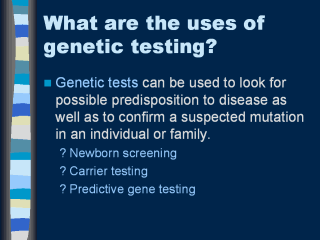|
|
|
|
front |1 |2 |3 |4 |5 |6 |7 |8 |9 |10 |11 |12 |13 |14 |15 |16 |17 |18 |19 |20 |21 |22 |23 |24 |25 |26 |27 |28 |29 |30 |31 |32 |33 |34 |35 |36 |37 |38 |39 |40 |Glossary |review |
 |
Genetic tests can be used to look for possible predisposition to disease as well
as to confirm a suspected mutation in an individual or family. The most widespread type of genetic testing is newborn screening. Each year in the United States, four million newborn infants have blood samples tested for abnormal or missing gene products. Some tests look for abnormal arrangements of the chemical bases in the gene itself, while other tests detect inborn errors of metabolism (for example, phenylketonuria) by verifying the absence of a protein that the cell needs to function normally. Carrier testing can be used to help couples to learn if they carry - and thus risk passing to their children - a recessive allele for inherited disorders such as cystic fibrosis, sickle-cell anemia, or Tay-Sachs disease (a lethal disorder of lipid metabolism). Genetic tests - biochemical, chromosomal, and DNA-based - also are widely available for the prenatal diagnosis of conditions such as Down syndrome. In clinical research programs, doctors make use of genetic tests to identify telltale DNA changes in cancer or precancer cells. Such tests can be helpful in several areas: early detection (familial adenomatous polyposis genes prompt close surveillance for colon cancer); diagnosis (different types of leukemia can be distinguished); prognosis (the product of a mutated p53 tumor-suppressor gene flags cancers that are likely to grow aggressively); and treatment (antibodies block a gene product that promotes the growth of breast cancer). Much of the current excitement in gene testing, however, centers on predictive gene testing: tests that identify people who are at risk of getting a disease, before any symptoms appear. Tests are already available in research programs for some two dozen such diseases, and as more disease genes are discovered, more gene tests can be expected. |